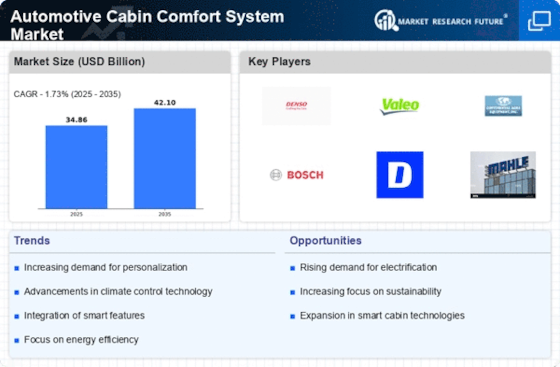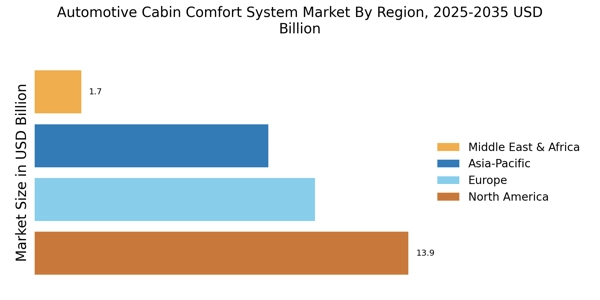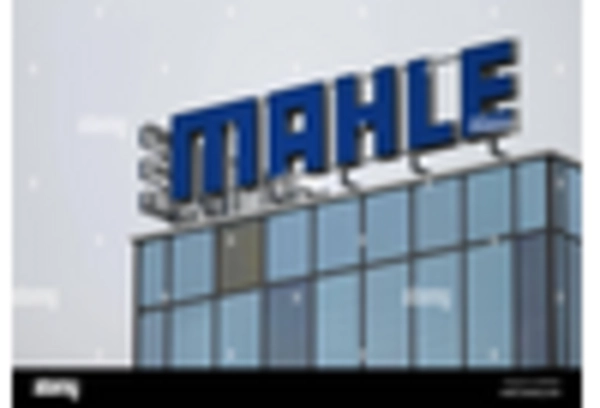Growing Electric Vehicle Adoption
The growing adoption of electric vehicles (EVs) is significantly influencing the Automotive Cabin Comfort System Market. As more consumers opt for EVs, manufacturers are focusing on enhancing cabin comfort to differentiate their products in a competitive market. Electric vehicles often provide unique opportunities for innovative cabin designs, such as quieter interiors and customizable ambient lighting. Market data suggests that the EV segment is expected to grow at a compound annual growth rate of over 20% in the next few years. This shift towards electric mobility is likely to drive demand for advanced cabin comfort systems that cater to the specific needs of EV users. Consequently, the Automotive Cabin Comfort System Market is poised for transformation as it adapts to the evolving landscape of electric mobility.
Rising Consumer Demand for Comfort
The Automotive Cabin Comfort System Market is experiencing a notable increase in consumer demand for enhanced comfort features within vehicles. As consumers become more discerning, they seek vehicles that provide a superior driving experience, which includes advanced seating, climate control, and noise reduction technologies. Recent data indicates that approximately 70% of consumers prioritize comfort when selecting a vehicle, suggesting that automakers must adapt to these preferences. This trend is likely to drive innovation in cabin comfort systems, as manufacturers strive to meet the evolving expectations of consumers. Consequently, the Automotive Cabin Comfort System Market is poised for growth as companies invest in research and development to create more comfortable and user-friendly environments in vehicles.
Regulatory Standards and Compliance
Regulatory standards and compliance requirements are becoming increasingly influential in the Automotive Cabin Comfort System Market. Governments are implementing stricter regulations regarding vehicle emissions, noise levels, and safety features, which directly impact the design and functionality of cabin comfort systems. For example, regulations aimed at reducing cabin noise levels have prompted manufacturers to invest in advanced soundproofing technologies. Additionally, compliance with environmental standards is driving the development of sustainable materials for cabin interiors. This regulatory landscape is likely to shape the future of the Automotive Cabin Comfort System Market, as companies must adapt their products to meet these evolving standards while ensuring consumer satisfaction.
Increased Focus on Health and Well-being
The Automotive Cabin Comfort System Market is witnessing a shift towards prioritizing health and well-being within vehicle interiors. Consumers are increasingly aware of the impact of cabin environments on their health, leading to a demand for features that promote air quality, ergonomic seating, and noise reduction. Recent studies indicate that a significant percentage of consumers are willing to pay a premium for vehicles equipped with advanced air filtration systems and ergonomic designs. This trend suggests that automakers must consider health-oriented features in their cabin comfort systems to remain competitive. As a result, the Automotive Cabin Comfort System Market is likely to expand as manufacturers respond to this growing consumer awareness and demand for healthier driving environments.
Technological Advancements in Cabin Systems
Technological advancements play a pivotal role in shaping the Automotive Cabin Comfort System Market. Innovations such as adaptive climate control, advanced sound insulation, and smart seating solutions are becoming increasingly prevalent. For instance, the integration of artificial intelligence in climate control systems allows for personalized temperature settings based on individual preferences. Furthermore, the market for smart seating solutions is projected to grow significantly, with estimates suggesting a compound annual growth rate of over 10% in the coming years. These advancements not only enhance passenger comfort but also contribute to overall vehicle efficiency. As a result, the Automotive Cabin Comfort System Market is likely to witness substantial growth driven by these technological innovations.

















